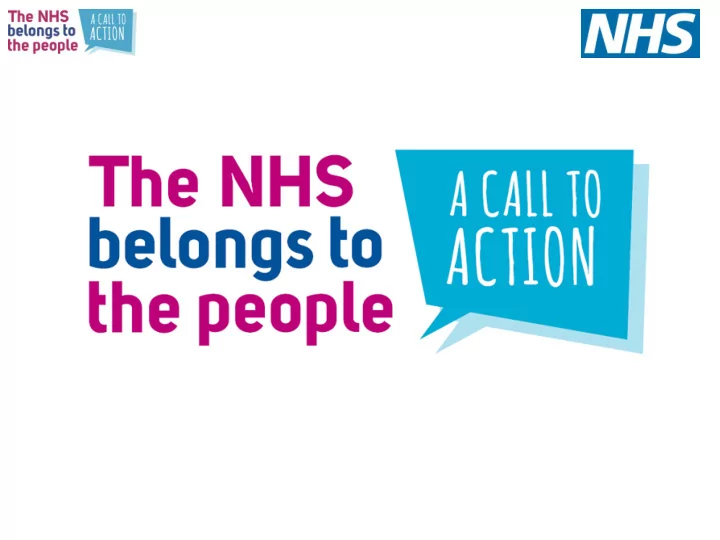

What are the national challenges?
65 years ago, the NHS began… • Founded in 1948 • Population of Britain was 47 million • Food rationing was still in place • Quarter of homes had no electricity • Life expectancy for men was 66
In 2013 Today and every day the NHS saves lives and helps people stay well and live well for longer. • The NHS treats 1,000,000 people every 36 hours • Between 1990 and 2010, life expectancy in England increased by 4.2 years • 88% of patients in the UK described the quality of care they received as excellent or very good
The NHS continues to be highly valued by the public Source: Ipsos Mori 2013
Current challenges • We know there is more to do and recommendations for improvement already exist
Demand for health An ageing population • Nearly two-thirds of people admitted to hospital are over 65 years old • More than 2 million people over 65 are admitted to hospital each year as an emergency • Demand for health and social care services is expected to grow in those aged 85 or older – the most intensive users of services
Demographic pressures Long term conditions • Those with more than one long term condition have the greatest needs and absorb more healthcare resources; for example, patients with a single long term condition cost about £3,000 per year whilst those with three or more conditions cost nearly £8,000 per year • These complex, high cost patients are projected to grow from 1.9 million in 2008 to 2.9 million in 2018 • If predictions are correct, and 46% of men and 40% of women are obese by 2035 , the result is likely to be 550,000 additional cases of diabetes, and 400,000 additional cases of stroke and heart disease.
Looking to the future Rise in long term Conditions • Diabetes up 29% by 2025 to reach 4 million An ageing population • The number of over 80s will double by 2030 Increasing expectations • Seven day access • New health technology
The future does not just pose challenges, it also presents opportunities • A health service, not just an illness service – we must get better at preventing disease • Giving patients greater control over their health • Developing effective preventative approaches, giving service users greater control over their health • Harnessing transformational technologies • Using all sources of information to improve health services • Moving away from a ‘one - size fits all’ model of care
Preserving the values that underpin a universal health service, free at the point of use, will mean fundamental changes to how we deliver and use health care services. This is NOT about: • Privatising the NHS • Charging for services • Restricting access
What are our local challenges?
10,127 babies were born in Leeds in 2011, around a third of these children live in deprived Leeds
Office of National Statistics expects the population of Leeds to increase by almost 12% between 2011 and 2021
Leeds has a large student population - this dramatically changes the overall age structure of the city so we do not have a large percentage of older or younger people in Leeds
14.4%, or 1 in 7 people in Leeds are aged 65 or over
Around 20% of Leeds falls within the worst 10% deprivation band in the country (double the deprived proportion of an average district)
23% of children under 16 are living in poverty
In 2010 - 11 there were 226 thousand attendances at A&E in Leeds (621 per day)
In the same period there were 87,102 emergency hospital admissions (238 each day)
Leeds North Clinical Commissioning Group Leeds South and East Clinical Commissioning Group Leeds West Clinical Commissioning Group
Recommend
More recommend